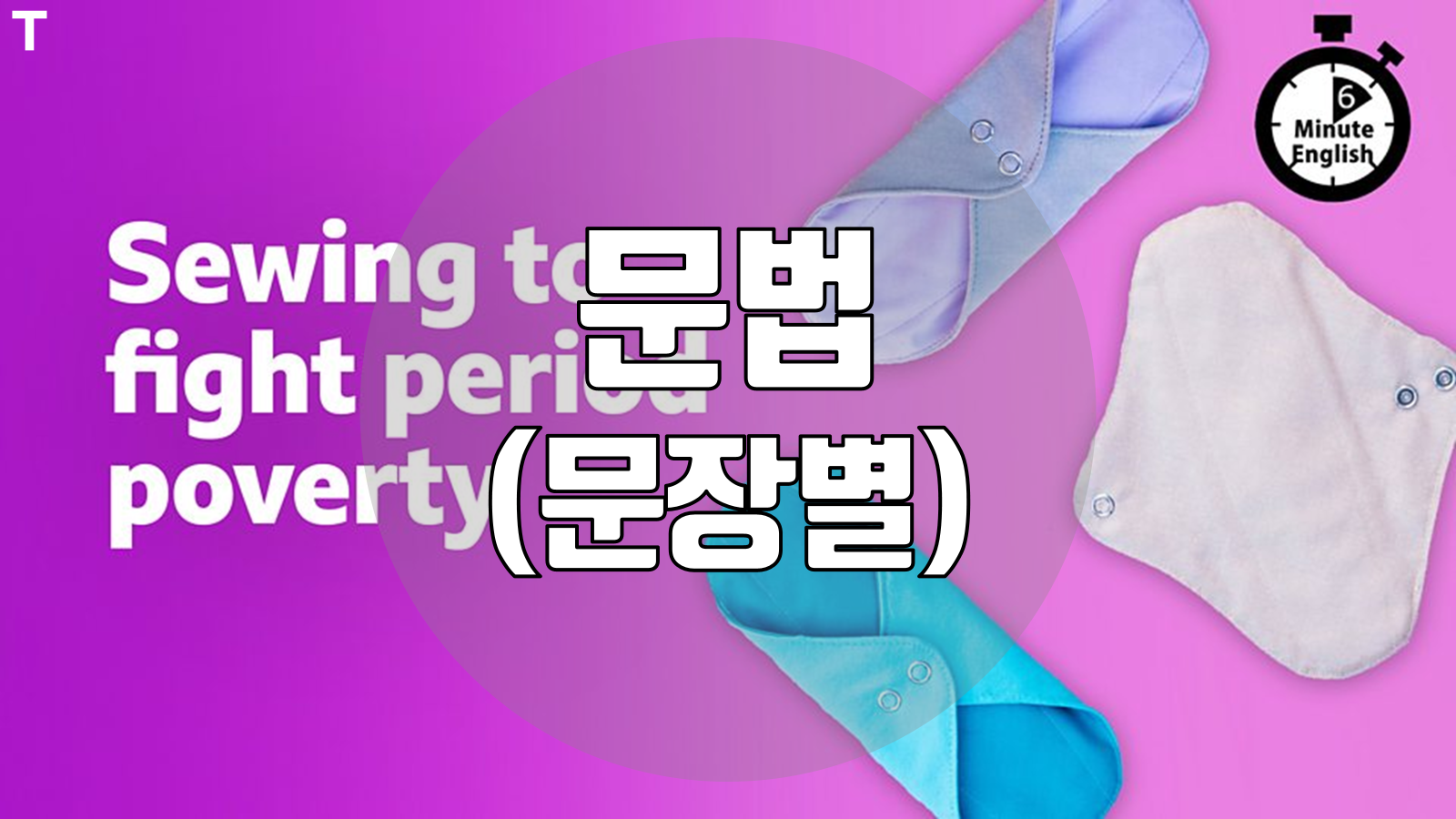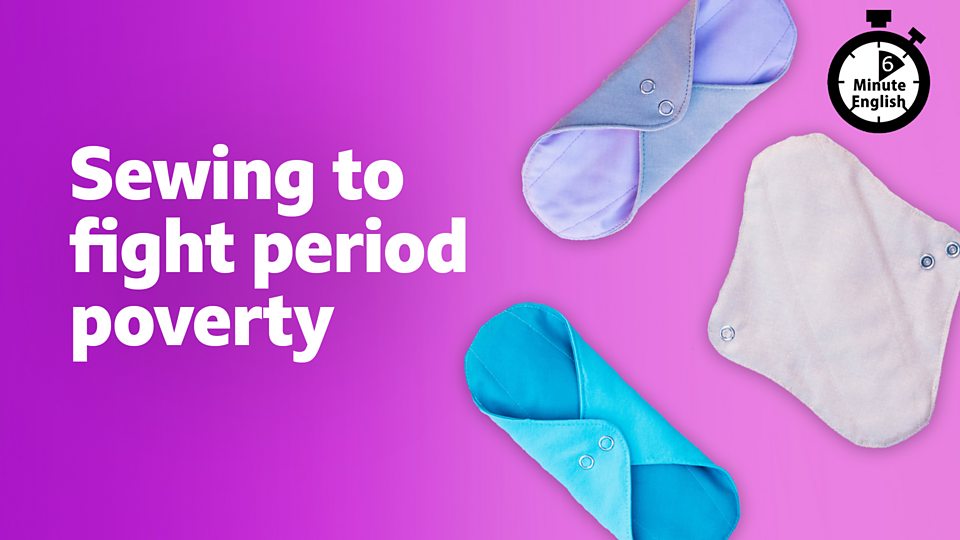
이번주 BBC Learning English - 6 Minute English가 다룬 문법 관련 이슈 는 관계대명사(10), 법조동사(3), 부정사(3), 분사(3), 의문사(2), 접속사(2), 동명사(2) 등이였습니다. 그 외에 동사: 구문과 용법, 문장형식: 4형식, 문장형식: 5형식, 부정 구문(否定構文), 관계부사, 조동사, 종속접속사, it, that, 수동태 등이 각각 1 건씩 다루어졌습니다.
[본문] [05] Menstruation is an issue that's not often talked about, yet every month it affects billions of women around the world.
[설명] ⑴ 『that's not ~』의 that은 관계대명사입니다. 격은 주격이고, 선행(명)사는 'an issue'입니다.
⑵ 『not often talked ~』는 부분부정 글짜임입니다. often이 아니오의 뜻을 같는 not과 묶여 부분적인 부정(否定)의 속내를 나타냅니다.
⑶ 『yet every month it ~』의 yet은 '그렇지만,그런데도'의 뜻을 가진 종속접속사로 부사절을 이끕니다.
[본문] [06] Menstruation, or periods, are a natural process that typically happen once a month when women and girls bleed from their vagina for a few days as part of the reproductive cycle.
[설명] ⑴ 『that typically happen ~』의 that은 관계대명사입니다. 선행사는 'a natural process'이고, 문장성분은 주어입니다.
⑵ 『when women and girls ~』의 when은 한정용법의 관계부사입니다. 선행(명)사는 「once a month」입니다.
[본문] [07] When this happens, women need special products like sanitary pads or tampons to manage the flow of blood and go about their day-to-day life.
[설명] 두개의 to부정사 「to manage the ~」와 「(to) go about their ~」가 to를 함께 쓰며 접속사 and로 이어져 있습니다
[본문] [08] Unfortunately, over 500 million people around the world either don't have access to these products or can't afford to buy them, and this is called period poverty.
[설명] 「either A or B」는 둘(간혹 둘 이상) 가운데 어느 하나를 가리키거나 고르는 상관접속사입니다. 두 개의 술부인 'don't have access to these products'와 'can't afford to buy them'을 이어줍니다.
[본문] [09] Period poverty has serious consequences, for example, girls on their periods not going to school affects their education, and women who can't work during their period have less income.
[설명] 『who can't work』의 who는 한정용법의 관계대명사 입니다. 격은 주격이고, 선행(명)사는 women입니다.
[본문] [10] What's more, it can cause health problems because, without sanitary products, its easy to get infections.
[설명] 『it's easy to get』은 to부정사(구)가 문장의 진짜·주어(眞주어)입니다. 형용사가 보충·어[補語, complement]일 때 대체로 이러한 글짜임을 갖습니다. its는 it's입니다
[본문] [21] She'd heard about period poverty and decided to put her lockdown time to good use by making sanitary pads, pieces of soft material used to absorb menstrual blood.
[설명] ⑴ 『to put her ~』는 to부정사의 부사적용법(목적)입니다. '~하기 위하여'의 뜻을 나타냅니다.
⑵ 『making sanitary ~』는 동명사(구)입니다. 전치사 by의 목적어입니다.
[본문] [22] Here's Ella explaining how her project got started to BBC World Service programme, 'People Fixing the World':
[설명] 「got started」 get 수동태 구문입니다.
[본문] [23] So I borrowed a sewing machine from a friend, I learned how to sew on YouTube, and then I just started making pads.
[설명] ⑴ 『how to sew』는 《how+to부정사》 글짜임으로 명사구의 쓸모를 합니다.
⑵ 『started making ~』은 동사+V-ing 글짜임으로 making은 동명사입니다. 동명사의 문장성분은 목적어입니다.
[본문] [25] Ella started making reusable sanitary pads which aren't a new thing.
[설명] 『which aren't a ~』의 which는 주격의 관계대명사입니다. 선행명사 'reusable sanitary pads'의 뜻을 묶어 주는 한정용법입니다.
[본문] [26] They're made from absorbent fabrics such as fleece and cotton sheets which means that they can be used over and over again after they're washed unlike disposable pads.
[설명] 『which means that ~』는 콤마가 없지만, 계속용법의 맥락을 갖습니다. 관계사절이 문장의 마지막에 있고, 특별히 선행(명)사의 속내를 묶고 있지 않습니다.
[본문] [27] Ella spent lockdown learning how to sew, how to join pieces of material by hand using a needle and thread, or with a sewing machine.
[설명] 『how to sew』와 『how to join ~』은 《how+to부정사》 글짜임으로 명사구의 쓸모를 합니다.
[본문] [28] In fact, Ella was so focused on sewing sanitary pads she didn't make anything else, and to this day, pads are the only thing she knows how to sew.
In fact, Ella was so focused on sewing sanitary pads {that} she didn't make anything else, and to this day, pads are the only thing she knows how to sew.
[설명] 이 월(=文章)은 「so that 글짜임」에서 부사절을 이끄는 접속사 that이 줄어들어 있습니다. 이 「so that 글짜임」은 목적 보다는 결과의 뜻과 맛에 가깝습니다.
[본문] [30] Sanitary pads aren't easy to make.
[설명] 『aren't easy to make』는 「be 형용사/분사 to부정사」 글짜임으로 'aren't easy to'가 동사원형 make의 조동사 쓸모를 합니다. 이를 준조동사로 보기도 합니다. '~하기가 쉽지 않다' 라는 속내를 가집니다.
[참조 링크]☞ 준조동사의 뜻 개념 / ought to, used to, need, dare [문법풀이 #63]
[본문] [31] The outer layer has to be soft because it touches the skin, but they also need to be absorbent, able to soak up liquids like blood and hold them.
[설명] ⑴ 『has to be ~』의 'have to'는 '의무'를 나타내는 서법조동사입니다.
⑵ 『need to be absorbent ~』의 「need to」는 '~일 필요가 있다'라는 속내를 갖는 (법)조동사의 쓸모를 합니다.
[본문] [32] What's more, Ella designed her pads to be washed and used again, unlike most sanitary pads bought in shops which are disposable, designed to be thrown away after they've been used.
[설명] ⑴ 『bought in ~』은 과거분사(구)로 'most sanitary pads'를 뒤에서 꾸며줍니다. 분사 앞에 '주격관계대명사와 be 동사'가 생략되어 있다고 생각할 수 있습니다.
⑵ 『which are disposable』의 which는 주격의 관계대명사입니다. 선행명사 'most sanitary pads'의 뜻을 묶어 주는 한정용법입니다.
⑶ 『which are disposable』의 관계대명사 which와 선행(명)사 「most sanitary pads」이 떨어져 있습니다.
[본문] [33] Ella's network of volunteers sewing reusable sanitary pads grew, and to date the Pachamama Project has donated tens of thousands of period products to refugees fleeing conflict in Syria, Turkey and Lebanon, as well as women here in the UK.
[설명] 『sewing reusable sanitary ~』는 현재분사 글짜임으로 volunteers를 뒤에서 꾸며 줍니다. 분사 앞에 「주격관계대명사와 be 동사」가 간추려져 있다고 생각할 수 있습니다. 「fleeing conflict ~」 도 현재분사로 refugees를 뒤에서 꾸며줍니다.
[본문] [35] Despite affecting so many people, and being necessary for life itself, many cultures consider menstruation unclean or shameful, not a topic of polite conversation.
[설명] ⑴ 『affecting so many ~』는 동명사(구)입니다. 전치사 despite의 목적어입니다.
⑵ 『many cultures consider ~』의 동사 consider는 5형식 동사입니다. 목적어는 menstruation, 목적어 보충·어[補語, complement]는 'unclean or shameful, not a ~'입니다.
[참조 링크]☞ 5형식 구조: 주어 + 동사 + 목적어 + 목적격 보어
[참조 링크]☞ (영어) 5형식 문형에 대한 이애 (동사의 종류)
[본문] [36] But Ella thinks her project is giving refugees the confidence to talk about periods, as she told BBC World Service's, People Fixing the World:
But Ella thinks {that} her project is giving refugees the confidence to talk about periods, as she told BBC World Service's, People Fixing the World:
[설명] ⑴ thinks 뒤에 명사절을 이끄는 접속사 that이 간추려졌습니다. 종속절의 문장성분은 목적어입니다.
⑵ 『giving refugees the confidence ~』는 give 4형식 글짜임입니다. 간접목적어는 refugees이고 직접목적어는 'the confidence ~'입니다.
⑶ 『to talk about ~』는 to부정사 형용사적 용법으로 'the confidence'를 뒤에서 꾸며 줍니다(뒷 꾸밈〈後位 修飾〉).
[본문] [38] Like, the women originally who were distributing the pads would barely even speak about it and we had it behind a curtain, and now they'll chat away about the pads with their male colleagues, anyone that comes into the shop…
[설명] ⑴ 『who were distributing ~』의 who는 제한적용법 주격의 관계대명사입니다. 선행사는 'the women'입니다.
⑵ 『that comes into ~』의 that은 관계대명사입니다. 격은 주격이고, 선행(명)사는 anyone입니다.
[본문] [39] Before, most women refugees would barely talk about menstruation, they would only just, scarcely talk about it.
[설명] 서법조동사 would는 습관적인 행동이나 규칙적인 행동을 표현합니다.
[본문] [40] But now they're happily chatting away, passing the time talking to other women, and even to male colleagues.
[설명] 『talking to other women ~』은 현재분사로 부사말(구)로 쓰이고 있습니다. 두개의 동사어구인 'chatting away, passing ~'을 꾸며줍니다.
[본문] [41] I think it's time I reveal the answer to my question - as a number, how many women make up the 26% of the world's population who menstruate?
[설명] 『who menstruate』의 who는 제한적용법 주격의 관계대명사입니다. 선행사는 'the 26% of the world's population'입니다.
pdf 파일은 이곳을 클릭하세요.
https://softca.tistory.com/2685을 클릭하세요.
이 블로그에는 [BBC 6분 영어와 관련하여 매주 다음과 같은 글들이 게시 됩니다
- 단어공부(금주 대본에 나온 주요 어휘) https://softca.tistory.com/2686
- 멀티단어공부(금주 대본에 사용된 멀티단어(구동사, 숙어) 간단 정리) https://softca.tistory.com/2687
- 독해공부(금주 대본의 문장별 해석(직역) 자료) https://softca.tistory.com/2688
- 문장별 문법공부(문장별 문법 설명) 이 글입니다
- 금주의 어휘(금주 대본에 나온 금주의 어휘를 집중적으로 정리한 자료) 이 글의 포스팅 시점에는 아직 작성되지 않았습니다.
- 항목별 문법공부(금주 대본에 나온 문법을 주제별/항목별로 정리한 자료) 이 글의 포스팅 시점에는 아직 작성되지 않았습니다.
- 금주의 구동사(금주 대본에 사용된 구동사 상세 정리) 이 글의 포스팅 시점에는 아직 작성되지 않았습니다.
- 금주의 PDF(금주의 PDF 및 기타 다운로드 파일) https://softca.tistory.com/2685
아래의 이미지를 클릭하시면 PDF로 된 대본(Script)를 다운받을 수 있습니다.
[영어 문장 공부] 자료를 처음 보시는 분은 아래의 링크를 클릭하셔서 「공부법」을 먼저 보시기를 권장 드립니다.
[영어문장공부] 학습법 보기






